Interview: Chris Roady & Keenan Ramos of THE SHAWSHANK REDEMPTION at Metropolitan Theatre Ensemble At The Warwick Theatre
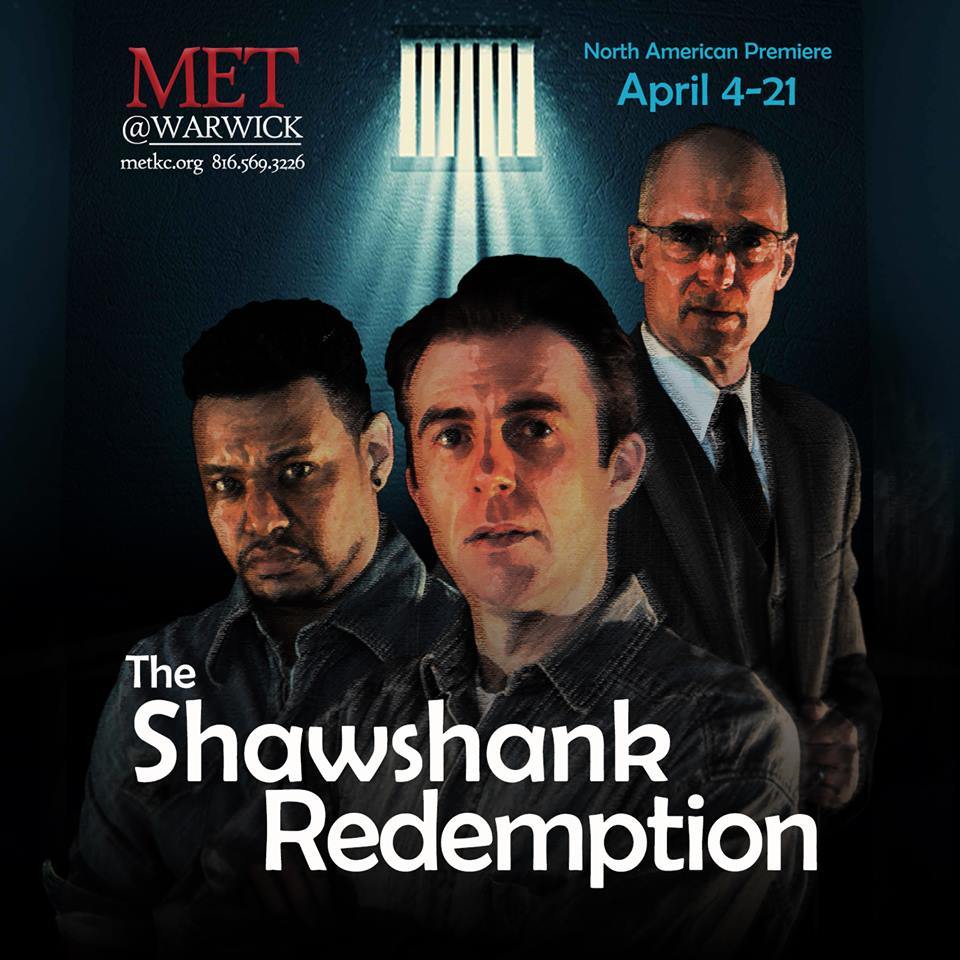
I recently sat down with the two actors playing the iconic roles of Andy Dufresne (Chris Roady) and Red (Keenan Ramos) in the world premier stage play "The Shawshank Redemption". This adaptation, from the original Stephen King novella, is by Owen O'Neill and Dave Johns. The new play opens at the Metropolitan Theatre Ensemble in the Warwick Theatre in Kansas City, MO April 4th and continues through April 21st, 2019
I will save writing a synopsis for my review next week and get right to the questions...
When approaching such an iconic role like Red, what did you find to be the most surprising?
(Keenan Ramos)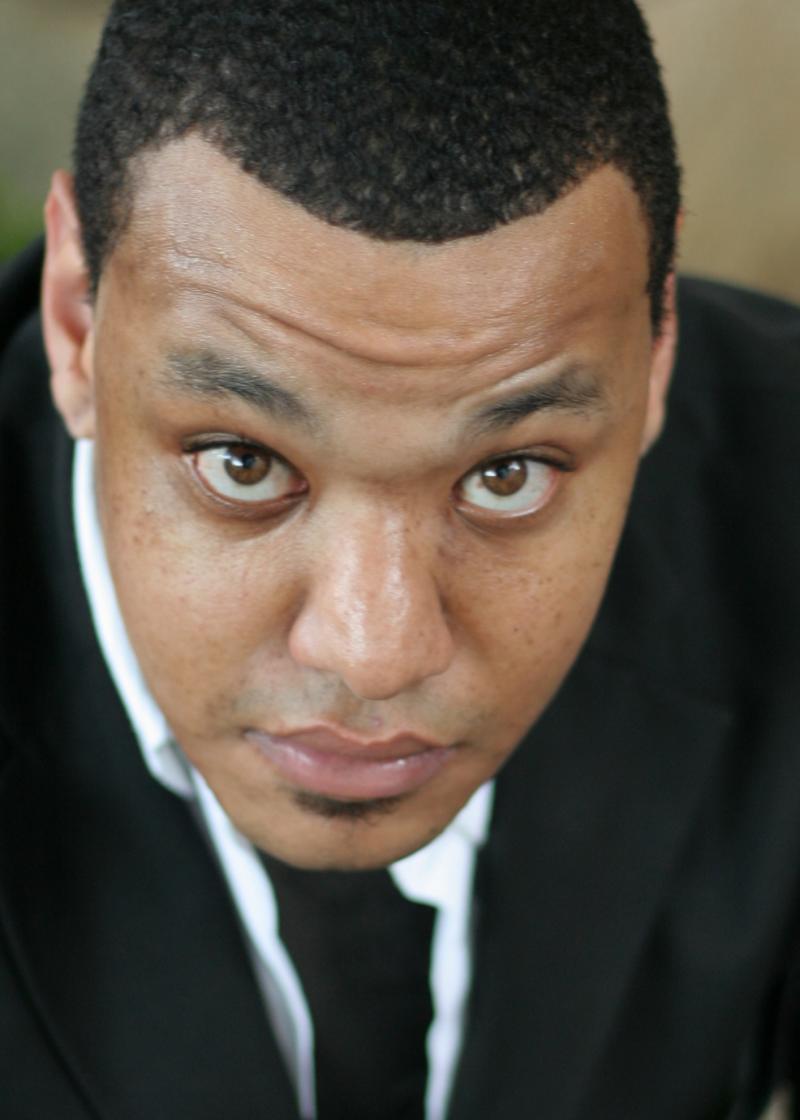
Most surprising thing in this script that may differ from the book or movie, that I picked out most, is that there Red came across with a certain warmth. This one he's a little bit more institutionalized. They've added an element with his hobbies, things that he did when he was on the outside, - he loved trains, which there are several references to in the script. But, he's let go of that, almost like he's let go of his humanity. He's let go of that for 30 years just to survive.
There is an element of hope in this story that conflicts with the despair of long term incarceration. How did you approach that particular point?
(Keenan Ramos)
I don't think he had much hope until Andy showed up and started putting that in his head. It didn't happen until the last few years of the play, when he was finally able to find it. The thought of Zihuatanejo (a Mexican coastal town) the town that Andy talks about, a town with no memory, just getting to that place. The tragedy in the movie is Brooksie - he doesn't make it - because he couldn't adjust to life on the outside. And, Red is so close to that, just like a lot of people even now who are incarcerated, but that little sliver of hope that Andy put in his mind made him want to get on that bus for Zihuatanejo.
How about Andy? Was there something there that was different than you anticipated?
(Chris Roady)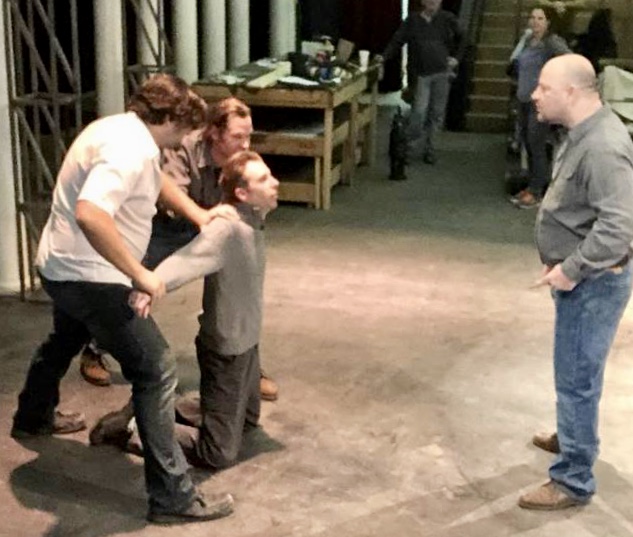
Yes, lots of things, the first thing Andy goes though a lot of changes throughout. In the first part he's very stuck up, for lack of a better word, there are a lot of references to him thinking he's better than everyone. It was difficult for me to get used to since I come to the character from the perspective of he's the one who's trying to help all these people. One of the difficult things was playing the first half of the play as somewhat of an outsider and then falling into the role of helper. The outburst at the end is always surprising to me when Andy is finally given a path to freedom and the warden stands in his way. That's like a switch that goes off in his brain and he says no, no you can't do this and all of that pent up aggression that he's been holding onto explodes.
Does the play stay with the same time period (beginning in 1948)?
(Chris Roady)
For the most part. The play condenses it somewhat as it has Andy entering prison in 1951. There are these little touchstones throughout the play that tell what the time is through things like a radio announcer of a baseball game talking about a game from 1951.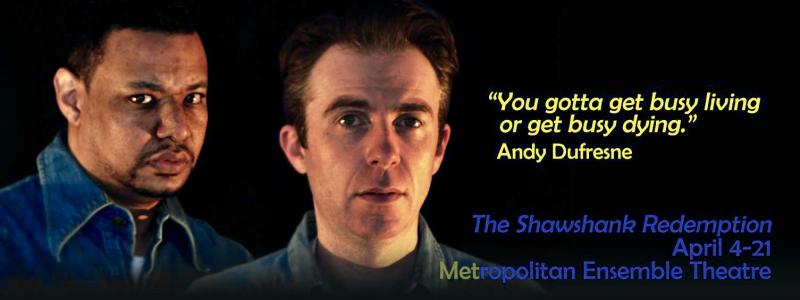
In the movie version Morgan Freeman (as Red) narrates from around the mid 1970's is that where this takes place and does the play retain a similar narrative?
(Keenan Ramos)
Oh yes, he gets to do the narration. His monologs help move the audience through the play. I have to bounce that dialog off the audience and play off of them.
So Andy had a fondness for the actress Rita Hayworth. Is that true in this adaptation?
(Chris Roady)
Oh yes, absolutely, we talk about Rita, the iconic poster is very much a part of this. We set out from the beginning not to try to recreate the film. The playwright, and us as a company, have always gone back to the novella as our source material. I read and reread the novella multiple times in preparation for rehearsals to begin. There were a few little lines from the novella that have slipped into the script that weren't there originally, of course with everyone's permission. One of them refers to Rita, from the book that's not in the film, where Red asks Andy what Rita Hayworth mean to you and he says freedom. You look at that pretty woman and you feel like you can almost step right through and be with her and be free. That to me has a lot of meanings, obviously when you see the ending it's actually very literal, but its also symbolic of the way Andy feels and the way he never gives up the hope that he will be a free man someday.
Andy's sense of hope throughout is different from Red's. With getting out of prison always on his mind, do you think he became somewhat of a master at manipulation?
 (Chris Roady)
(Chris Roady)
Yes, absolutely. He learns early on that he is in fact smarter and more sophisticated than everyone including the guards and the warden. He can play the warden, it's a give and take, he gives some to get something back for himself. In the end, he wins out over the warden.
There's a difference between how incarceration was perceived back in the 1950's versus today. In that era there seemed to be a perception that it was not just loss of freedom, but punishment. In viewing it from the historical perspective and what we see in our society today what kind of conclusions came to your mind?
(Keenan Ramos)
Oh man you're gonna get me started! Red says in the play at the end when he comes before the parole board, "I couldn't care less, so you're gonna do what you have to do, because I know that I'm in here for punishment". Now days, they try to hide behind rehabilitation, they say, but it's not about rehabilitation. I could go on about the system now and how it's overcrowded and trying to make a lot of money. Has it really changed that much? What do you think?
(Chris Roady)
It's hard to say. I think you're onto something with the money. I do think the for-profit prison organizations we have right now are using incarceration just for profit. It's a shame, because on the surface it seems like they don't care that much about rehabilitation, certainly not as much as they should. But, there are, on the other side of the coin, a lot of great organizations out there that are working within the prison system that are more geared toward rehabilitation and readjustment so that the men and women who are incarcerated can make a positive impact to society once they have paid their debt to society. I think it's better than it was, certainly the conditions are better, and there are more advocacy organizations that are outside the prison and federal system that are helping.
In the original story the character Red was Irish. That changed in the movie. In the context of a black man coming to trust a white man - how do you think Red came to bridge the trust gap?
(Keenan Ramos)
In the novel, in the movie, and in this script - Andy pays his dues, he takes his punishment, he takes it like a man. I think that Red respects that. Respects how smart he is, how he keeps his head down when he goes to work and does what he has to do. But, he sees an inner light in Andy and when he gets them that beer, sacrifices so much, and is almost tossed off the roof, just to get them three beers. It doesn't matter if you're white or black or polka dot or stripped, whatever, he did that for them and he didn't have to. And, he didn't even drink beer he gave all of it to the other prisoners.
Do you think Red believed Andy's story about the stone wall and the volcanic rock?
(Keenan Ramos)
Not until he got there. Andy was so important and special to Red that the least he could do was to go to that tree and find that rock. He (Andy) helped him get that far and he just had to trust.
(Chris Roady)
I think it's and interesting and nice touch that Stephen King put in there about his (Red's) journey to find the oak tree is symbolic of showing that he has finally started to hope. He says "I hope that this is true" and ends with him saying "I hope". So, I think that's why Red makes that trip to Buxton to find out, because he finally has something hopeful.
(Keenan Ramos)
He's just going step by step and Andy is with him all the way. He has to make that step out of prison, he has to make a step to go to work, he has to make that step to Buxton. He says "I hope I can cross the border". Just making that one step to reunite.
So you two have mentioned the original author, Stephen King. If he were here what question would you ask him?
(Chris Roady)
I want to know his inspiration for this story. From what I've read he wrote this story based on stories he heard about prison, and I'd love to know what those stories are. I'd probably ask him a lot of unrelated questions because his work is so prolific. I'd maybe ask him which genre he likes to write more (this type of story or horror).
What is it about this production you are particularly proud of?
(Chris Roady)
I am really proud of how we are taking the story and stripping it down to the bare bones of just storytelling. Like I said, we set out at the beginning not to try to recreate the film. Because, if we tried to recreate the film we would fall short. I like to think of our production as a version that simply presents these characters, and the story, to remind the audience of what resonated to them in the film.
(Keenan Ramos)
I want to be clear that we told our own story, but at least we found the heart of it. The heart of everything and I think everyone has. It's a totally different interpretation and Chris's interpretation than Tim Robbins, we're dealing with a different script, my interpretation of course is not Morgan Freeman. But, I hope that the heart and warmth are there and that's what audiences will want to see. That they will still have that same feeling walking out of this play as they did after they left the film.
You've both acted in other shows here at the MET, and now this one, so what other role would be your personal dream role.
(Keenan Ramos)
Hamlet! It terrifies me! I love Shakespeare, but that is such a beast of a role. I thought that August Wilson (playwright) was difficult. But, yes, I'd love to.
(Chris Roady) I'm a big fan of Eugene O'Neil. I think he's a genius. One of my first plays when I finished my graduate studies was "Long Day's Journey Into Night", and I played Edmond. At that point I was in my mid 20's, and now that I'm almost 40 so I feel like I'm Ready to Play Jamie, the older brother in that play. And, then in about 20 years I'll be Ready to Play Jim. So, that has been a dream of mine for a long time to do the show two more times playing the other characters.
When you first asked that question, my mind went in a different direction and that was to say that playing Andy in Shawshank Redemption is something I never thought I'd have the opportunity to do and its such a thrill. When I first made the announcement on social media I put in my post - I never thought I'd have the opportunity to say this, but I'm thrilled to announce that I'll be playing Andy Dufresne in The Shawshank Redemption. It's something that never crossed my mind as a possible opportunity.
(Keenan Ramos)
It's so beloved. I too made the announcement on facebook and usually I'll say something about the role and get about 40 likes, but with this one I got about 300 likes with so many saying it's their favorite movie of all time; and I can't wait to see you. So, it's a little bit of pressure, but yeah it's cool.
What did you think when you heard this show was having it's premier here at the MET in Kansas City and not in New York?
(Chris Roady)
I wasn't surprised. Bob and Karen Paisley always tend to take risks and I commend them for it. I was thrilled, honestly, and it may be a little selfish to say, but I know them, and have worked here before, and would have a better chance of getting this role than a theatre where I didn't have a relationship established.
(Keenan Ramos)
They (Bob & Karen) like to think outside the box. They march to their own drum here and if there's a script out there that they like, they're going to go for it. They pour a lot of heart and soul into this place, everything that they have, and I respect them a lot for it.
The Shawshank Redemption runs from April 4-21, 2019 at the Metropolitan Theatre Ensemble in the Warwick Theatre, 3927 Main Street, Kansas City, MO 64111
Purchase tickets through metkc.org or call 816-569-3226
Photos courtesy of Metropolitan Theatre Ensemble.
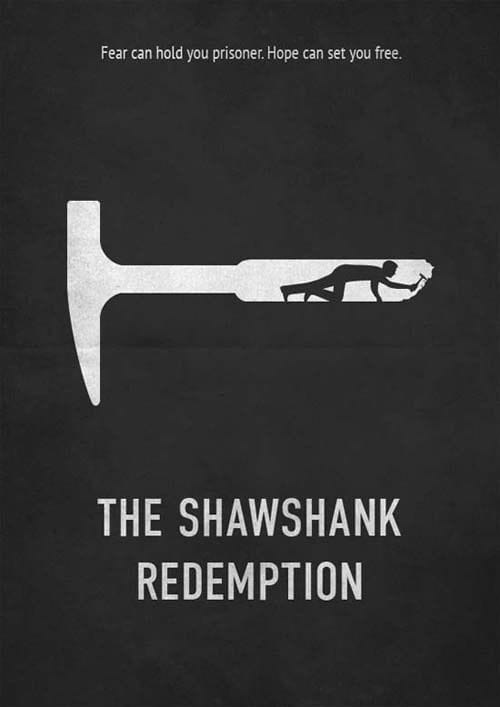
...and watch for my review of the show next weekend here at BroadwayWorld.com
Comments
Videos

